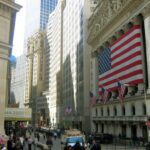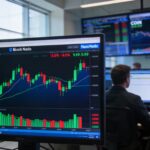
France’s CAC 40 index has recovered from its lows reached at the beginning of March 2022, but the risk of another decline still persists, especially if the Ukraine crisis worsens.
The impact of the Russian-Ukrainian war and the rising risks of the recession continue to worry investors, and for now, we can not see the light at the end of the tunnel.
Russian forces bombarded the outskirts of Kyiv and a besieged city in northern Ukraine a day after promising to scale down operations. Russian policymakers said nothing is promising in negotiations, adding that there’s still much to do to reach a breakthrough.
Russian President Vladimir Putin is threatening to halt contracts supplying Europe with a third of its gas unless they are paid in roubles, and the EU economy could soon be faced with one of the largest energy supply shocks ever.
In an effort to reduce the EU’s dependence on Russian energy, the US agreed to increase liquid natural gas (LNG) exports to the EU by 15 billion cubic meters in the 2022 year.
The war between Ukraine and Russia continues to cause supply chain issues for many companies that look to find other sources for their parts. Raw materials and commodities prices have surged since the invasion, intensifying already-high inflation.
European Central Bank members believe that inflation is likely to continue higher than predicted for longer, and according to a flash estimate published by Eurostat, annual inflation in the euro area is expected to reach 7.5% in March, up from 5.9% in February.
As for the whole of Europe, rising inflation is a threat to the French economy, but French Finance Minister Bruno Le Maire said that the French economy is “doing well” thanks to a rise in consumer spending.
French economy rebounded back above pre-pandemic levels of output with a growth of 7% in 2021, the country’s fastest expansion for 52 years.
The unemployment rate has fallen to a 10-year low, and this is certainly good information for President Emmanuel Macron, who is expected to seek a second term in April’s elections. Mathieu Plane from the French Economic Observatory (OFCE) said:
Macron’s policies have been quite pro-business though he’s had to adapt some of them amid crises, including the yellow vest protests and COVID. Overall, France’s economic attractiveness on an international level has definitely improved.
France’s election race heads to the first round of voting on April 10, and Emmanuel Macron has a strong argument to persuade voters that the reforms of his first term are bearing fruit.
Technical analysis
France’s CAC 40 index has recovered from its lows reached at the beginning of March 2022 and closed the week at 6,684 points.

If the price falls below the 6,500 support level, the next target could be around 6,300 or even 6,000. On the other hand, if the price jumps above 6,800 points, the next target could be 7,000 resistance.
Summary
France’s CAC 40 index has recovered from its lows reached at the beginning of March 2022, but the risk of another decline still persists, especially if the Ukraine crisis worsens. French economy rebounded back above pre-pandemic levels, and France’s election race heads to the first round of voting on April 10.
The post CAC 40 forecast ahead of France’s presidential election appeared first on Invezz.
from Market Analysis – Invezz










 Join our Telegram Channel
Join our Telegram Channel